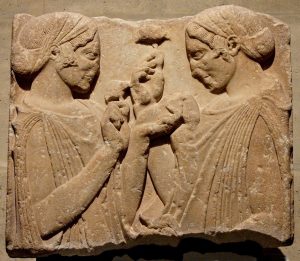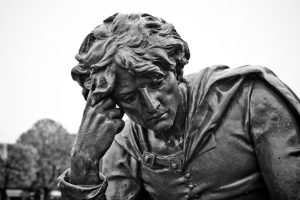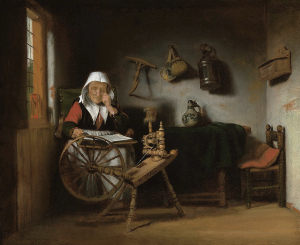Thebes and its Discontents: Psychology and Politics in Sophocles and Freud
A civil war ends when an authoritarian leader takes over the city. A woman tries to bury the body of her brother, but is forbidden by the leader. She speaks out against him, and becomes a rebel against the regime in the process.
So, What Now? Understanding Nietzsche’s On the Genealogy of Morality. (And Stay Tuned for the Deepest Secrets of Life.)
It was in the late 19th century that Friedrich Nietzsche launched his famous attack against religion and its moral precepts. Since the time of Nietzsche’s writing, Western society has only become more secular.
Comparing The Philosophies of Mohandas Gandhi and Friedrich Nietzsche As Outlined In On The Genealogy of Morality and Hind Swaraj
Mohandas Gandhi’s treatise Hind Swaraj lays out the philosophical groundwork that outlines how India should depart the British Raj and become a self-governed nation.
Rousseau, Reason, and the Films of Human Shame
To Jean-Jacques Rousseau, reason is a burden. To him, it planted in humanity a coven of abstract fears and vices and was responsible for leading humankind to “purchase imaginary repose at the price of real happiness.”
Sacrifice, Suffering, and Politics: Exploring Dharma and its Centrality to the Attainment of Swaraj
As Hind Swaraj pieces together a passionate argument, I briefly solicit attention towards the hidden paradoxes, subtilties, and the interplay between philosophy and politics that dharma entails.
Hamlet: Revenge Over Remembrance
Few facts are certain in William Shakespeare’s Hamlet, whether in terms of its characters’ allegiances, the motivations behind their actions, and in a few cases, even the sanity of some characters.
The Inevitable Fact of Captivity in Typee: A Peep at Polynesian Life
Given the dramatic conclusion, Typee: A Peep at Polynesian Life invites the readers to reflect upon the force of one’s innate desire to be free, as well as the Eurocentric colonial narratives that engrain a lingering and potent prejudice.
Objectification Versus Subjectification: The Self-Perpetuating Cycles Between the Psyche and Society
It is through the intricately-detailed prose of Frantz Fanon’s writing that scenes of objectification are depicted in Black Skin, White Masks.
Our Lives are Built on Weaving All Our Stories into Worlds We Call Our Own: The Stories that Create Personal Identity in Margaret Laurence’s A Bird in the House
A Bird in the House is a collection of stories narrated by a character named Vanessa. While Vanessa the narrator is an adult, the collection is about a younger Vanessa, who is a writer in her own right.
A Charkha Between Kallipolis and Worker’s Utopia: Unraveling Gandhian Self-Rule and Self-Control through Marxist and Platonic Philosophy
[…] Gandhi’s notion of personal self-control may be understood as a spiritual entity transcending both Karl Marx and Plato as well as the text’s conception of modernity.









